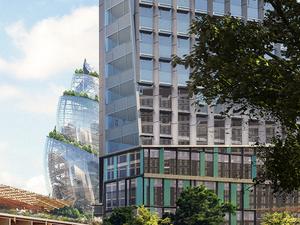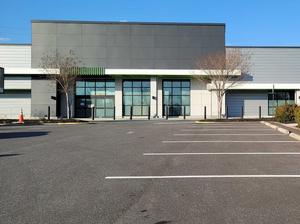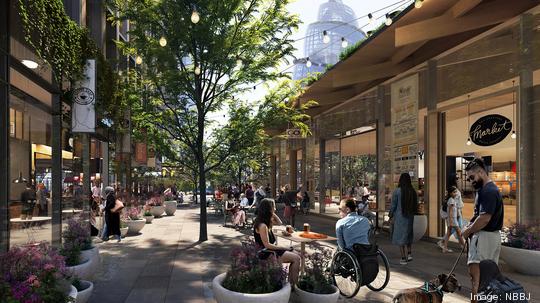
Amazon.com Inc. plans to prioritize leasing retail space at its D.C.-area offices to businesses owned by people from historically underrepresented groups, an official with the e-commerce and cloud computing giant said recently.
“We're still in the process of curating and finding those retailers, but our goal is small, local, minority- and women- owned,” Joe Chapman, Amazon’s director of global real estate and facilities, said of the company's retail leasing strategy during a meeting of Arlington's long range planning committee April 19.
While Amazon (NASDAQ: AMZN) has already made a number of pledges when it comes to how it would fill the retail space, it hasn't stated so bluntly this commitment to focus on underrepresented business owners.
Amazon should have about 185,000 square feet of retail space in Pentagon City between Metropolitan Park, which is under construction now, and PenPlace, where work is expected to begin in 2022, pending Arlington County approval. Amazon plans to deliver the first part of that retail, about 69,000 square feet at the base of Met Park's two 22-story towers, in 2023.
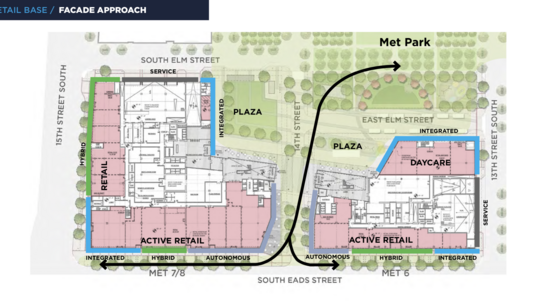
The rest of the retail square footage — about 115,000 square feet — will be at the larger PenPlace site, which would include three standalone pavilions, three traditional office buildings and the “Helix” skyscraper, which will combine Amazon meeting spaces and public attraction. The 11-acre site, with 3.3 million square feet of development, is projected to open in 2025.
Despite being a massive player in e-commerce and, increasingly, physical stores, Amazon will favor small businesses over large retailers in its spaces. It also won’t duplicate existing businesses in the neighborhood, Chapman said.
“What's important to us about the retail for both Met and PenPlace is that we want to curate the retail,” Chapman said. “And we want to look for opportunities to support not only local businesses and small minority- and women-owned businesses. Our goal is to make sure that we add to the neighborhood, into the community and not just for Amazonians but for folks in the neighborhood.”
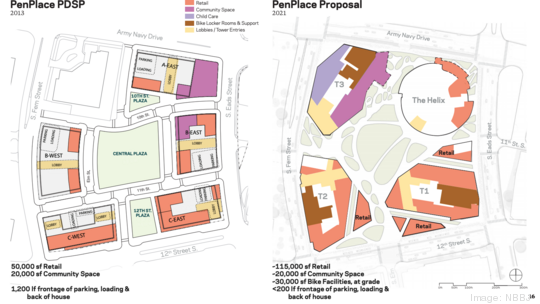
The promises Amazon has made on the retail front are perhaps not surprising for a company that has said it isn’t super interested in the revenue these leases will generate. Much like at its Seattle offices, Amazon has said there will be no spaces left empty.
The company aims to work with its development partner, JBG Smith Properties (NYSE: JBGS), to find offbeat business to fill the street-level space, it said. Amazon also said it will push its employees to shop with these merchants, and will discount rent for those tenants that struggle to make ends meet at first.
These practices mirror those that Amazon applies to its 220,000 square feet of retail space in the Seattle area. The company has only allowed a few large chains to lease space there — some banks and a Starbucks, which an Amazon spokeswoman noted is headquartered in the Puget Sound region. But exactly how Amazon will execute this new diversity focus at its Arlington headquarters is not yet clear.
Amazon's push to highlight women- and minority-owned businesses in its retail leasing is in line with a broader effort to address racial disparities. A lot of this began with the 2020 protests against the killings of George Floyd and other Black people by police, and company founder Jeff Bezos publicly supporting the Black Lives Matter movement.
Since then, Amazon released detailed diversity data for its corporate employees and leadership for the first time in four years. The numbers showed it remains, like many tech companies, largely white and male. But the company pledged to double Black representation in these areas this year.
The company has also committed to a $2 billion affordable housing initiative to create or preserve 20,000 units in five years. In addition to looking for scalable ways to add housing around its hubs in the D.C. area, Seattle and Nashville, the so-called Housing Equity Fund will look to sponsor projects from groups that are minority-led.
Executives have also promised to hire a diverse team for the Arlington headquarters. It has not set targets on that and won’t release data on specific offices.

